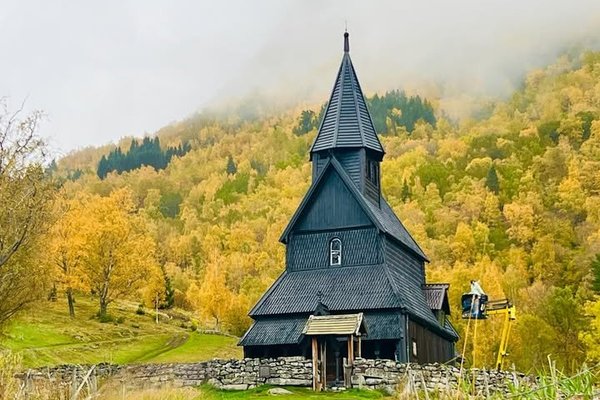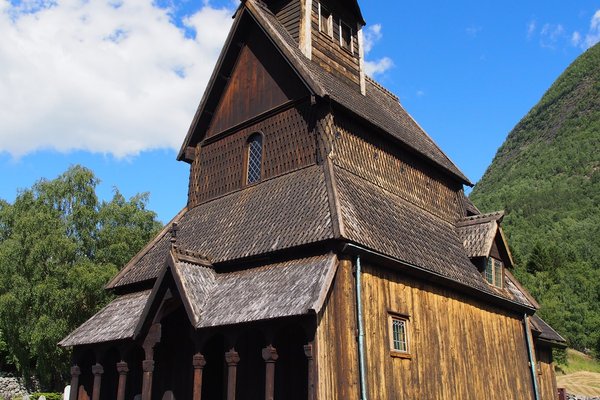Norway
Urnes Stave Church
The Urnes Stave Church is an outstanding example of medieval Scandinavian wooden architecture.
From the original ca. 1,300 stave churches in Norway, only 28 remain and the Urnes church is one of the oldest of its kind. Romanesque stone architecture was emulated using Scandinavian construction techniques with wood. It further distinguishes itself by its decorative carvings. Those in the interior show the link between the pre-Christian Viking traditions and the transition to Christianity.
Community Perspective: a small but distinctly Norwegian church. Christer and Nan have described the long way of getting there on public transport. The church can be entered in summer when guides are present or by obtaining the key from the neighbour.
Site Info
Official Information
- Full Name
- Urnes Stave Church (ID: 58)
- Country
- Norway
- Status
-
Inscribed 1979
Site history
History of Urnes Stave Church
- 1979: Inscribed
- Inscribed
- Type
- Cultural
- Criteria
- i
- ii
- iii
Links
- UNESCO
- whc.unesco.org
- Official
-
- stavechurch.com — Stave Church Urnes
- Related
-
- nrk.no — Article on Urnes Church (in Norwegian)
All Links
UNESCO.org
- whc.unesco.org — whc.unesco.org/
Official Website
- stavechurch.com — Stave Church Urnes
Related Resources
- nrk.no — Article on Urnes Church (in Norwegian)
News Article
- Nov. 5, 2019 forbes.com — Norway’s Historic Stave Churches Are Even Older Than Previously Thought
Community Information
- Community Category
- Religious structure: Christian
Travel Information
Recent Connections
-
Patrimonito's World Heritage Adventures
-
Built in the 12th century
rebuilt towards the mid-12th century (A… -
Perfect Inscriptions
1979
Connections of Urnes Stave Church
- Geography
- Architecture
- World Heritage Process
-
-
Perfect Inscriptions
1979 -
First inscriptions
Norway: two inscriptions in 1979, with Urnes Stave Church as the first reported and the lowest number.
-
- Timeline
-
-
Built in the 12th century
rebuilt towards the mid-12th century (AB)
-
- Literature & Film
News
- forbes.com 11/05/2019
- Norway’s Historic Stave Churches A…
Recent Visitors
Visitors of Urnes Stave Church
- Adam Hancock
- AK
- Alexander Lehmann
- alicemears
- Allan Berry
- ALS
- A. Mehmet Haksever
- Argo
- Astraftis
- Atila Ege
- Bin
- Birgitte Sørensen
- Christer Sundberg
- Claire Bradshaw
- Cluckily
- ctravel
- Dan Pettigrew
- DavidS
- Dorejd
- DutchHorn
- Elaine McArdle
- Els Slots
- Erik Jelinek
- Eva Kisgyorgy
- Fan Yibo
- Farinelli
- Feldhase
- Frederik Dawson
- FS
- g.emma_bae
- George Gdanski
- GeorgeIng61
- Gernot
- Gjert
- HaraldOest
- Harald T.
- Harry Mitsidis
- Hdhuntphotography
- Hurrvinek
- Iain Jackson
- IreneKD
- Ivan Rucek
- Jacob Choi
- Jacob Otten
- Jan-Willem
- Jarek Pokrzywnicki
- Jezza
- Joel on the Road
- Jonas Hagung
- Jonas Kremer
- Jonas Martinsson
- jonathanfr
- Juha Sjoeblom
- KarenBMoore
- Karito Vies
- Kasia M.
- Knut
- Krijn
- Kurt Lauer
- Lars Bogstad
- Laurine
- Lazerway
- Lindaflat
- Luboang
- Luis Filipe Gaspar
- Malgorzata Kopczynska
- Marinemajor
- Martina Rúčková
- Marty
- maryhattie
- MichaelH
- Mihai Dascalu
- Mikko
- Milan Jirasek
- Miloš Tašković
- MMM
- nan
- natlefebvre@hotmail.
- Nihal Ege
- Olli-Pekka Turunen
- opperpco3
- Palimpsesto
- Patrik
- Paul Schofield
- Petteri
- Philipp Leu
- Philipp Peterer
- phillipmeng
- Porcho
- Priyaranjan Mohapatra
- Rachel Perkins
- Ralf Regele
- Randi Thomsen
- Roger Ourset
- Roman Raab
- Sandra!
- Sergio Arjona
- Shandos Cleaver
- sime147
- Simonh
- Solivagant
- Svein Elias
- Szabolcs Mosonyi
- Szucs Tamas
- Tarquinio_Superbo
- Tatiana Nikulnikova
- Thorben
- Tom Flaten
- Tsunami
- WalGra
- Wimmy
- Wojciech Fedoruk
- Wo_ko
- YaroMir
- Zoë Sheng
Community Reviews
Show full reviews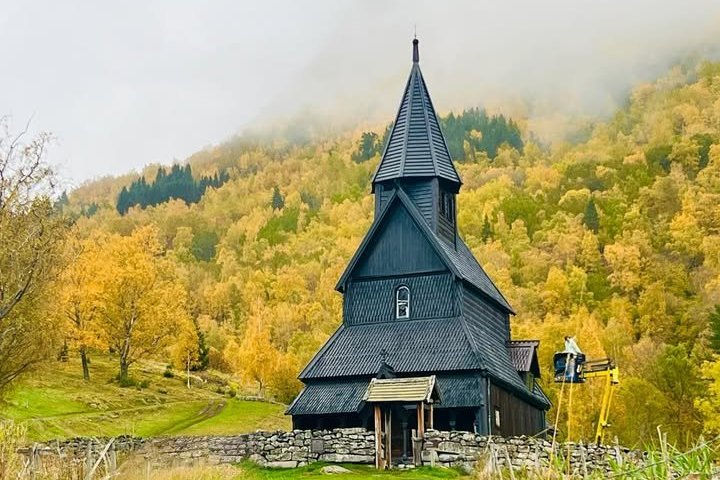
My friends and I began our visit to the Urnes Stave Church in the small town of Sogndal, nestled deep within Norway’s fjord country. Most travelers heading to Urnes would simply drive to the nearby village of Solvorn and take the short ferry across the Lustrafjord to Urnes or Ornes. But instead of following the usual route, we decided to take the long way around, driving along the fjord through Skjolden and looping down the opposite side toward Urnes.
It turned out to be one of the most memorable drives of our trip. The road was narrow and winding, hugging the edge of the Lustrafjord as it curved through small farms, forests, and quiet hamlets. Often it narrowed into a single lane where two cars could barely pass. The scenery was breathtaking: steep green slopes plunging into deep blue water, occasional glimpses of waterfalls, and scattered wooden houses clinging to the hillsides. At times, the road led into dark, one-lane tunnels carved straight through the rock, where headlights illuminated only a small circle ahead. The air inside felt cool and damp. It was nerve-racking, yes, but also strangely beautiful. As we approached the small village of Ornes at the end of the fjord, the road climbed gently uphill through clusters of houses and farms. Only then did the Urnes Stave Church come into view, a modest, dark wooden structure standing quietly on the slope above the fjord. From a distance it looked simple, almost humble, but up close its details …
Keep reading 0 comments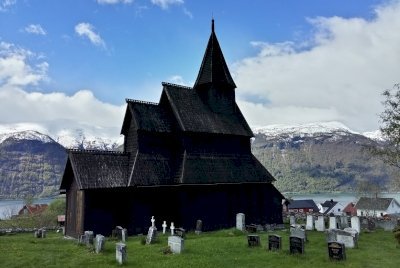
On the eastern shores of the Lusterfjord in Western Norway lies Urnes Stave Church. It's a wooden church and there are plenty of those inscribed on the list. But stave churches in general and Urnes in particular are distinctly Norwegian and clearly a world apart from the many flavors of wooden churches you find in e.g. Eastern Europe.
Urnes itself isn't a large church. It's a small church that can host maybe 20 (?) people, mostly the family of the local noble as it was a private church belong to the noble's estate. I would assume the local population could join occasionally. But that wouldn't have swelled the ranks significantly. The area was never densely settled (and it isn't to this day). The rough climate and terrain greatly limited the space available for agriculture and with it the population the region could support. Side note: There is a reason the Viking went for raids so much.
Urnes claim to fame is that it's the oldest original surviving stave church in Norway. And that it features original Viking wood carvings combining Viking and Christian mythology.
In addition, its location is stunning. The fjord, the mountains, ... It feels as if the whole landscape was composed to create a truly unique site.
Norway has more stave churches on offer. Near Oslo there is one shown in the folk museum. Probably, the most internationally known one is Heddal, which I visited with Randi and Svein. You pass it when …
Keep reading 0 comments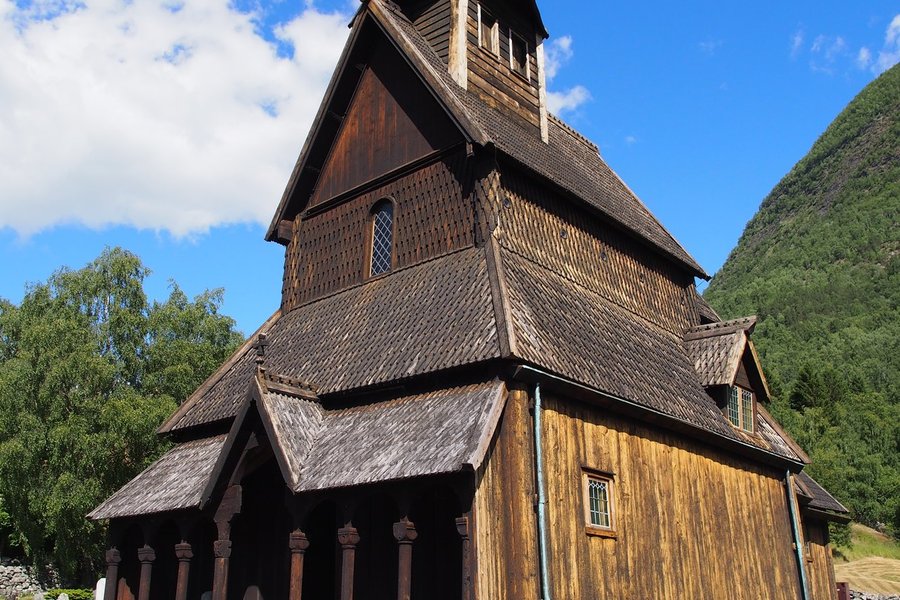
My husband and our daughter drove to Urnes to see the Stove Church. We spent the night across the fjord from Urnes at a hotel in Wallaker. Took the ferry ride across and visited the great sight of the church. We had a reason to want to see it as our last name is Urness. The cemetery around the church had many headstones with the name Urnes on them. The name got changed from Urnes to Urness when the grandparents came to the US. It was well worth the trip. We wanted to find out more about our heritage but couldn't find anyone to talk to.
Keep reading 0 comments
I visited Urnes in November 1983 primarily to see the iconic carvings i'd studied in an old Larousse art history book. I had no idea of the difficulty in getting there from Oslo but guessed at the nearest train stop on the Bergen rail line and hitchhiked to a town in the right direction. In Solvorn by lunchtime the next day I found myself on the last ferry across to Urnes. The wonders of the exterior almost made a night in a boatshed along the edge of the fjord worthwhile. Although the church had been closed to tourists when i was there, a death in the village (and a lift back to town with the local builder who turned out to be a contracted gravedigger) allowed me to gain access the next morning. Highly recommended. I doubt it would be so beautiful if it were not so isolated.
Keep reading 0 comments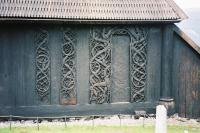
After a long and hot summer trip to Greece I decided to wind down for a couple of days in my beautiful neighboring country Norway. I had already visited most of the World Heritage Sites in Scandinavia but not yet the Stave Church of Urnes, a fact that had annoyed me for some time. So it was now high time to “tick it off” as my 146th site. Once in Oslo I embarked on the Bergen-train and traveled up the mountains to Myrdal where I hopped off in order to take the world-famous Flåm-banan down to the fjords and here catch a connecting bus to Sogndal.
Flåm-banen is a major tourist attraction in itself and as the train slowly makes its 860 meters way down to the fjords, through tunnels and mountainsides, you can enjoy a wonderful view including mountains, waterfalls and small villages. In Flåm you can catch ferries to Bergen and other destinations along the Norwegian coast.
My bus trip from Flåm to Sogndal took about 2 hours and on it’s way it passed through the 24,5 km long Laerdal-tunnel, the longest tunnel in the world. At the time I was ignorant enough not to be aware of it’s existence and certainly not of it’s length so after some 15 minutes of traveling through the tunnel I was beginning to wonder whether this was a surreal dream where I was captured in the mountain!??? Despite my worst worries the bus did get out and arrived in Sogndal and …
Keep reading 0 comments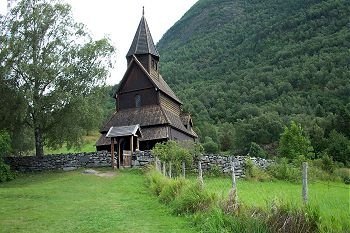
The world heritage sites I like best are those that require some effort to get to. That's also the case with Urnes: a flight, a local bus, a hired car and a small ferry (and 4 hours) took me there.
The Urnes church lies high on the slopes. Because of its relatively small size, it cannot be seen from below. After a steep climb, you are rewarded by this sight that is both very familiar (I've seen lots of pictures) and striking (its almost perfect shape).
Visitors to the site (and they are relatively numerous in summer) can go inside the church with a guide. An explanation is given about its history. That it has been rebuilt several times but that there are some original elements left. And that it is still used as a church, once a month during the summer months.
Keep reading 0 comments
